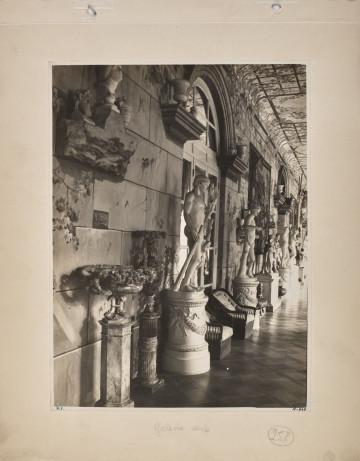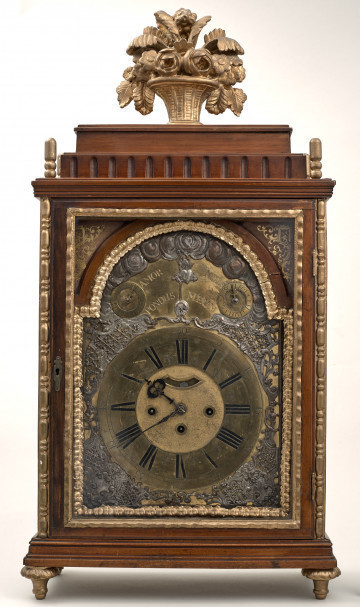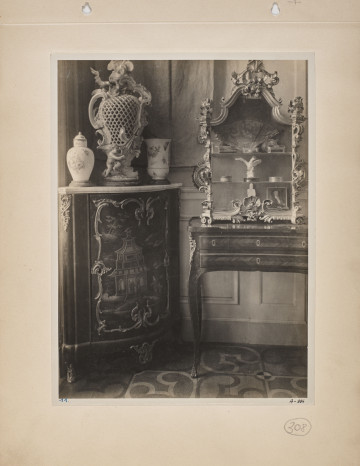
Interiors
20th century
Castle Museum in Łańcut
Part of the collection: Interiors
Historical names: „Galerya” (inwentarze zamku z lat 1802, 1862), „Galerja z rzeźbami” (Spis inwentarzowy ruchomości zamku łańcuckiego, 1929 r.).
Time of origin: ca. 1792
Architects: Jean François Thomas de Thomon (1759–1813).
This room is located on the first floor of the Łańcut castle, in its southern wing. It belongs to the castle's representative rooms. It is a rectangular room with cut corners on the south, with six tall, rectangular windows. It was furnished ca. 1792 on the initiative of Duchess Izabela Lubomirska née Czartoryska (1736-1816), the owner of the castle in Łańcut, to house a part of her collection of sculptures, acquired mainly during the Duchess's journeys to Italy in the years 1785-1786.
The Sculpture Gallery was decorated according to the project of the French architect Jean François Thomas de Thomon. Under the influence of the antiquity fashion prevailing in the Classicist era and the developing Pre-Romantic cult of nature, the Sculpture Gallery was arranged as a romantic ruin of an ancient building. Its walls are decorated with an illusionistic painting showing the interior of the ruin covered with trellis entwined with vine branches. On the side walls there is painted a regular wall pattern made of large stone blocks, suggesting the monumental dimensions of the building. The wall is shown cracked and damaged in some places, with shoots of grapevines growing over it. On the ceiling there is painted a trellis entwined with vine branches, through which there can be seen a blue sky with clouds. The colors of the interior are dominated by the dark yellow background of the wall and the colors of the vegetation: green, blue, brown, red. The building is captured in the sunlight, clearly emphasized by the play of light and shadow. Right next to the entrance to the Gallery (on the western side), on a rock scrap sticking out of the ruin, there is an inscription: ANTIQUITATIS SACRUM HOC/ STUPENS QUIS CONDIDIT QUERIS/ GRATIAE DECENTES INDICABUNT/ NOMEN CARUM IPSIS (Full of admiration you ask who erected this sacred temple of antiquity, the grateful graces will reveal the name so dear to them). At the far end of the room, at the top of the northern wall, there is painted a damaged tombstone dedicated to the great writer of Greek tragedies, Aeschylus. The fireplaces carved in two opposite, shorter walls were given an irregular shape of stone blocks. There are boulders and stone blocks mounted into the walls which constitute a kind of plinths for vases and sculptures. Moreover, there are lapidary fragments embedded in them, such as bas-reliefs, mosaics with landscapes and still lifes.
In the northern, main wall, there are three shallow semi-circular recesses with mirror doors installed in 1911: from the west they lead to the back of the theater, from the east they are false; the central recess is covered with a painting with a landscape from the same year. The doors in the side recesses are covered with valuable paintings that are a part of the illusionistic interior of the Gallery created in the times of Duchess Izabela Lubomirska, showing views of the ruins of ancient Roman buildings: the Baths of Caracalla (in the western recess), the Temple of Concord in the Roman Forum (in the eastern recess). These paintings were discovered in 1993 (see B. Trojnar, Nieoczekiwane odkrycie, “Spotkania z Zabytkami” 1994, no. 5). The painting in the central recess from the times of Izabela Lubomirska is not known; it probably represented a similar theme.
Along the walls of the Gallery there are marble sculptures from the collection of Duchess Izabela Lubomirska and the subsequent owners of the castle in Łańcut – the Potocki family.
Bibliography:
B. Trojnar, Rzeźba w Muzeum-Zamku w Łańcucie. Dzieje kolekcji, ekspozycja, katalog, Łańcut 2006).
Compilation:
Barbara Trojnar
Object type
Interiors
Creation / finding place
Owner
Castle Museum in Łańcut
Identification number
Location / status

20th century
Castle Museum in Łańcut

3rd quarter of the 19th century
Castle Museum in Łańcut

20th century
Castle Museum in Łańcut
DISCOVER this TOPIC
Castle Museum in Łańcut
DISCOVER this PATH
Educational path